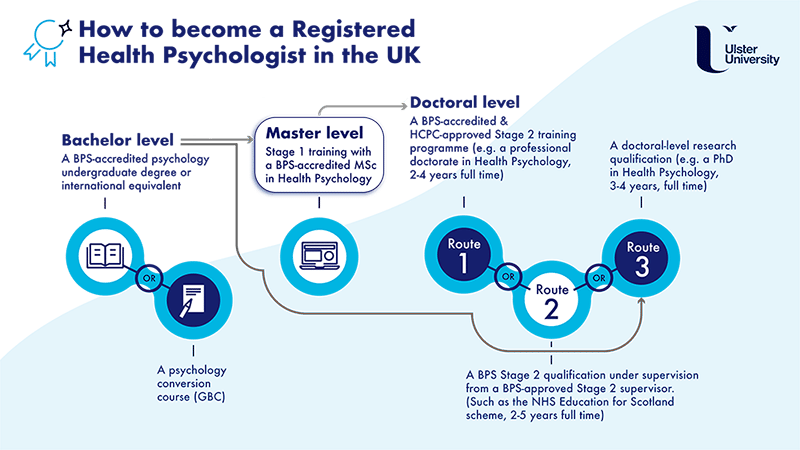Blogs
Keep up with all the latest thoughts and opinions.
We make it happen.
How to become a Health Psychologist
Monday, September 26th, 2022

Health psychology is at the forefront of personalised healthcare, conducting ground-breaking research into the connection between mental and physical health. At Ulster University, we have an internationally respected Health Psychology department, run by a strong academic team of Registered Health Psychologists and active researchers paving the way for the future of health psychology.
Below we cover common questions asked about health psychology, aiming to help you better understand how to become a health psychologist in the UK.
1. What is a health psychologist?
The job of a health psychologist is to build awareness of good health and wellbeing, for individuals, groups and the wider population, with a focus on mental health to help form healthy habits and ditch unhealthy ones.
The role of a health psychologist can vary depending on the setting. Trained health psychologists can work in clinical settings such as hospitals or rehabilitation centres, or in non-clinical workplaces such as community centres or public health departments.
When working with individuals in a clinical setting, health psychologists will actively communicate with their patients to establish trust and gain insight into their health history and current health problems. From there, the health psychologist will work with the patient to plan recovery and promote healthy living; for example, through cognitive therapies and coaching.
2. What does a health psychologist do?
A health psychologist promotes healthier ways of life and encourages people to improve their behaviour to benefit their overall health.
Clinical professionals work directly with patients and healthcare staff to deliver efficient care through clinical interviews and behavioural assessments, while academic researchers push for field developments to improve the application of psychology in the healthcare system.
According to the NHS careers website, a health psychologist may be tasked with:
- Identifying unhealthy behaviours such as smoking, drug abuse and poor diet and using psychological principles and interventions to support prevention and behavioural change for health reasons.
- Encouraging healthy behaviours such as exercise, healthy eating, oral hygiene, regular health check-ups and preventative medical screenings.
- Researching how behaviour affects health and illness through a range of models and frameworks. You will help explain and predict behaviour and develop interventions (i.e. changing health beliefs and/or building self-control) based on your findings.
- Investigating the effectiveness of communications between healthcare professionals and patients to develop improved intervention strategies at all stages of the healthcare journey.
- Addressing the psychological impact of illness on individuals, families and carers and developing empathetic ways of dealing with patients, families and the wider community.
- Helping patients help themselves by providing advice on self-managing illness and information on organisations and local authorities available to give support.
3. What does a health psychologist treat?
As our understanding of the relationship between mental and physical health grows, our understanding of the applications of health psychology widens.
Currently, the field helps to treat and prevent a range of non-communicable diseases such as obesity and diabetes, as well as encouraging healthier lifestyles among the wider population.
A health psychologist’s job can include (but is not limited to):
- Developing treatment and recovery plans for post-op patients
- Aiding long-term patients with cancer and chronic illness to manage pain
- Helping patients overcome addiction and other unhealthy behaviours through cognitive therapy
- Improving nutritional health through diet planning and therapy

4. Is health psychology a growing field?
Health psychology is a relatively new branch of psychology, cemented as a professional practice in the 1980s. Since then, it has rapidly emerged and widened the scope of psychology and clinical healthcare around the world.
With increasing strain on the NHS, preventative healthcare has become a priority for the UK healthcare sector. In the coming years, career prospects and research opportunities for health psychologists will grow, notably within hospitals, clinics, rehabilitation centres and substance abuse treatment facilities.
Health psychologists in government and education sectors will also be in high demand, helping to tackle health crises (such as childhood obesity) and shape health policy for the next generation.
5. What is the difference between a psychologist and a health psychologist?
A clinical psychologist may be involved in the treatment of a wide range of mental health problems such as schizophrenia, bipolar and depression. A health psychologist, meanwhile, is more specialised in handling mental health challenges that affect physical health and illness.
As a result, a health psychologist is best suited to treat problems such as addiction, obesity and chronic pain. Anxiety, stress and depression may also be in the remit of a health psychologist, especially if impacting physical health.
| Health Psychologists | Psychologists |
|
*Clinial psychology can overlap with health psychology, specifically when treating anxiety, depression and stress |
For more information on the differences between the two fields, see our guide to Health Psychology vs Clinical Psychology.
6. What skills does a health psychologist need?
When working in a clinical setting, a health psychologist will likely be working with individuals (in a patient-healthcare professional relationship) to determine the path of treatment and recovery. Due to the close nature of this relationship, strong interpersonal skills and emotional intelligence are needed.
During the online Health Psychology Masters at Ulster, as well as gaining Stage 1 Training in becoming a Registered Health Psychologist, you will learn a wide range of practical skills for work in the field, including:
- Ability to identify and apply relevant research methodologies and techniques
- In-depth knowledge of appropriate and ethical models of statistical analysis
- Critical awareness of professional behaviour in a variety of contexts
- Ability to evaluate theories of behaviour change and apply to health-related behaviours and cognitions
- Psychological assessment skills
To learn more about skills needed in individual roles, see our guide to the Top 6 Health Psychology Skills.
7. How long does it take to become a health psychologist?
To become a Registered Health Psychologist in the UK, you’ll need to hold an accredited undergraduate degree in psychology and a Masters qualification in health psychology approved by the HCPC, followed by a doctorate-level qualification in a health psychology specialisation of your choice.
Taking into account three years of undergraduate study, two years of Masters study and three to four additional years of doctorate research, it will take at least eight years to achieve Registered Health Psychologist status in the UK.
8. How do I become a chartered health psychologist?
The term ‘chartered psychologist’ refers to psychologists who have successfully completed Stage 1 and Stage 2 training and are registered with the British Psychological Society (BPS). Those with specialised health psychology training may use the term ‘Registered Health Psychologist’ after completing their Stage 1 & Stage 2 training and registering with the Health & Care Professions Council (HCPC).
To earn a Graduate Basis for Chartered Membership (sometimes known as Graduate Basis for Registered Membership), you’ll need to complete a Masters degree with BPS accreditation (Stage 1 training). Then, from there, continue to a doctorate-level position (Stage 2 training) before being registered as a professional with the BPS and/or HCPC.
The online Health Psychology MSc programme with Ulster University provides psychology graduates with Stage 1 training on the journey to becoming Registered Health Psychologists. After completing your Masters, you’ll earn a Graduate Basis for Chartered Membership of the BPS; a common prerequisite for many BPS-accredited post-graduate and doctoral programmes.
9. Where can a health psychologist work?
A common question surrounding health psychology is ‘can a health psychologist work in a hospital?’ The answer is yes; hospitals are among the most common places of work for health psychologists. Similar clinical settings include mental health clinics, rehabilitation centres and substance abuse treatment facilities.
Besides clinical practice, health psychologists can work in non-clinical settings such as community centres or government departments to support the public health sector with policy and programme development in an office or laboratory setting.
Health psychologists can also remain within academia after graduation, developing ground-breaking research in the field.
To learn more about skills needed in individual roles, see our guide to the Top 6 Health Psychology Careers.
10. How to gain Stage 1 training to become a health psychologist
Ulster University offers its BPS-accredited online Health Psychology Masters programme as a way for busy professionals to gain Stage 1 training, a vital step in becoming a Registered Health Psychologist.
Our course curriculum is relevant and timely, designed by active researchers and Health Psychologists to meet industry demand. The programme is 100% online with flexible study hours, so you can study anytime and anywhere in the world and gain an internationally recognised Masters qualification without the need for a career break. Read our FAQs for more information.
If you are looking to switch careers into psychology but do not meet the entry requirements for the Health Psychology MSc, you can also consider the Psychology (Conversion) MSc (all graduates welcome to apply).


